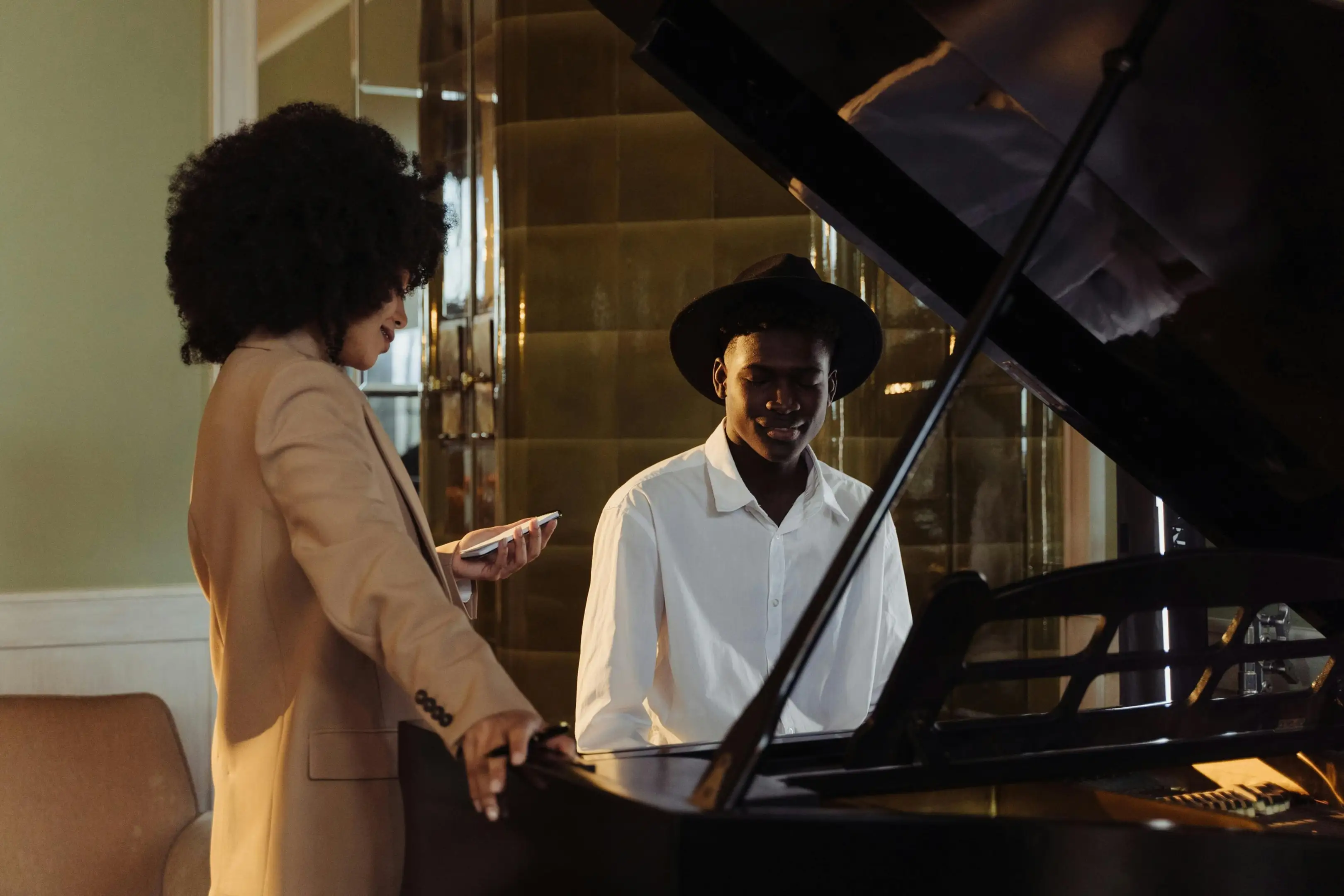If you're serious about having a lasting career in the music business, it's essential to have a good understanding of the types of business deals available. This can mean wading through the confusing world of rights, royalties, contracts, and occasionally, the legalese that comes with it. Fortunately, we're here to demystify one elusive aspect of the music industry: the publishing deal.
Below, we'll explain exactly what you can expect from a publishing deal in music: detailing what it is, the benefits and drawbacks of securing one, what to look for in your contract, and other tips when it comes to navigating the industry as a songwriter and musician.
So, What is Music Publishing?
Before we start diving into various deals, let's analyze what music publishing refers to: a song's composition. This can include a track's melody, topline, lyrics, and overall arrangement. This is in contrast with the master recording copyright or the master rights of a song, which speaks to the parties or party that owns the rights to the original sound recording of a track.
Royalties are paid out separately for master recording holders and music publishers. In fact, you'll notice within your PRO (Performance Rights Organization, you can learn more about that here) , you can only attribute 50% of performance royalties to both publishers and master recording copyright holders: both are owed royalties separately.
When we speak about publishing, we're strictly talking about those who are behind the composition of a track, which usually boils down to songwriters, composers, and music producers.
Introduction to Music Publishing Deals
Now that we know what music publishing is, lets try to understand what a publishing deal is.
Essentially, a publishing deal is a contract between a publisher and a songwriter. The songwriter assigns some or all of their composition copyright to the publisher in exchange for the publisher performing a variety of services.
Some of the services a publishing company or individual may conduct on behalf of the songwriter include royalty collection, promotion, negotiating rates, licensing, and setting up songwriting sessions with other musicians.
For instance, large labels and music publishing companies like Sony Music or Universal Music may sign a particularly talented songwriter, outlining parameters like producing a certain number of songs or generating enough royalties to recoup an agreed-upon advance.
Music publishing deals are more or less the equivalent of getting a record deal, but as a songwriter rather than an artist.
Critically, it's important to understand that songwriters do not traditionally get any percentage or "points" on the rights to a master recording. For this reason, songwriters typically have to boast a vast, successful catalogue in order to turn a significant profit outside of an advance from a publishing deal.
How do music publishing deals work?
The ways in which music publishing deals work vary in specifics, but essentially, a publishing deal is an agreement between a songwriter and a publishing company.
The publishing company conducts various tasks, including collecting and distributing royalties, admin work, and potentially connecting writers with others within the industry in exchange for a portion of the songwriter's publishing.
Essentially, publishers back songwriters with various levels of financial, admin, and networking support for a cut of the songwriter's publishing.
The Different Types of Publishing Deals Explained
Here is a rough overview of the different types of deals you might expect from a music publisher:
- Sub Publishers: Under this deal, a foreign publisher administers royalties in another region or country.
- Single Song Agreement: Sometimes, a music publisher may want to test out a songwriter before they sign them on for a more extensive deal. A publisher may sign on for a limited number of songs before reassessing for contract renewal.
- Administration Deals: If songwriters simply need help with administrative tasks, they can enter in an admin deal, which typically does not dip into their share of the composition credits. Instead, admin houses are paid a fee, typically 10-20% of royalties to administer works without losing any ownership of the songs themselves.
- Full Publishing Deals: The songwriter assigns copyright to the publisher, who distributes earnings between themselves and the songwriter. These exclusive contracts often include a cash advance, industry connections, and professional resources, though they offer less creative control overall.
- Co-Publishing Deal: These deals are the most common within the world of songwriters today and are often seen as some of the most equitable. Songwriters usually keep 75% of the total publishing income while the publishing company takes 25% in the place of a fee.
What Terms Can You Expect in a Publishing Contract?
When reviewing a publishing contract, you're likely to come across the following parameters, which you'll want to prioritize according to your individual needs as a writer:
- Term: This speaks to the length of the contract, which could be defined by a certain number of songs or years.
- Territory: The territory defines the spaces in which a publisher is administering your songs.
- Rights Granted: These are the rights that are designated to the publisher's share of administration. This may include synchronization rights, distribution, performance and reproduction rights.
- Reversion Rights: Reversion or retention rights outline at what point rights revert back to the songwriter. This is a critical area to be mindful of, as the retention period can extend far past the length of a publishing contract.
- Royalty Splits: Royalty splits determine how income is divided between you and your publisher. In most cases, the songwriter signs on for 100% of their share, and the publisher gets a portion or all of the publishing share of the composition royalties.
- Advances: Advances are upfront payments, recoupable against future royalties. Until the advance is fully recouped, songwriters will not receive additional payment.
- Creative Control, Approvals, and Exclusivity: Both songwriters and publishers may have some sway over musical compositions and who each party works with, depending on the contract.

Why Should I Consider Working with a Music Publisher?
Signed writers typically have a wealth of experience within the music industry already, so getting to the point at which you have a publishing deal is a feat in itself.
One of the main benefits of working with a music publisher is gaining access to a network of bonafide writers and performing artists who can help you advance your career. Publishing can also provide valuable administrative support as well as advances or other financial incentives to help artists stay in business.
How Do Performing Rights Organizations Interact with Music Publishers?
Outside of streaming royalties, publishers and musicians alike work in tandem with PROs or Performing Rights Organizations, to help collect public performance royalties. These are organizations like ASCAP or BMI in the United States that help track down and distribute performance royalties as needed.
It's crucial to be set up with your PRO when making music to ensure that you receive what you're entitled to as an artist. If you have a publisher, your publisher may work in tandem with your PRO to collect and distribute your royalties for you.
What is the difference between a record deal and a publishing deal?
A record deal is an arrangement between an artist or band and a record label, whereas a publishing deal is an arrangement between songwriters or composers with publishing companies. Both can have advances and negotiable terms, but each deal focuses on a different aspect within the industry.
What does 50% publishing mean on a beat?
Half of the publishing on beat refers to 50% of the composition credits surrounding a track.
Nowadays, beatmakers may ask to make a portion of the publishing if they put in significant hours surrounding the writing of a track. Traditional producers back in the day did not make publishing because they weren't necessarily a huge part of the writing of the composition.
Nowadays, the terms and roles between producer and beatmaker can become much more intertwined, so determining splits across both and master recording points can be much more nuanced.
How long are music publishing deals?
The length of music publishing deals varies greatly depending on the terms of your individual agreement.
It's also worth noting that there's a difference between the term in which you're working with a publishing company versus the retention period, which constitutes the time after a contract is finished, where the publisher still retains rights to your work.
With that in mind, here is how long you can expect common deal structures to last:
- Admin Deals: Admin deals can range between 1-5 years where the songwriter holds onto 100% of the copyright, but the publisher will collect music publishing royalties and conduct administrative tasks in exchange for a fee.
- Traditional or Full Publishing Deals: These deals, otherwise called Exclusive Songwriter Agreements, are less common nowadays, asking for exclusive rights splits within a specific term or in exchange for the delivery of a certain number of songs. These agreements can start at a 1-year term with the option to extend.
- Co-Publishing Deals: This is the most common deal you'll come across, with a term length that lasts between 1-3 years with the option to renew. In this case, 50% of the publishing is given to the songwriter, and the other 50% is given as the publisher's share.
Understanding Co-Publishing
You'll come across some short-term publishing deals and exclusive publishing deals in rare scenarios, but most songwriters have co-publishing deals in this day and age. A co-publishing deal basically entails sharing copyright ownership or royalties between a songwriter, publisher, and potentially another party as payment.
Under this structure, co-publishing gives songwriters more control over who they work with and may provide different royalty rates, advances, and other terms than traditional publishing deals.
Working with smaller, indie publishing companies can also offer a more personalized plan, which may be favorable for certain songwriters. Co-publishing agreements can be more flexible in contrast to exclusive deals, where songwriters can only work with agreed-upon parties.
Red Flags to Look Out for In Music Publishing Deals
Being offered music publishing deals is undoubtedly exciting, but try not to let the shine cloud your judgment. Without proper scrutiny, you can unintentionally rope yourself into an unfavorable deal, which can be more harmful than helpful in terms of uplifting your career as a songwriter.
Before you sign any publishing deal, get a lawyer . It may feel expensive upfront, but it's worth the initial costs to protect you and your career. Even so, you'll want to be wary of the following when signing a deal:
- If it's too good to be true... as the saying goes, if it feels too good to be true, it probably is. You and your publisher should have fair and understood terms across the board, where it's clear how each party benefits. There are no free rides in the music industry.
- Opaque Accounting: Avoid any deals that have a no-audit clause or a general lack of transparency when it comes to accounting or tracking royalties.
- Unreasonable Royalty Splits: Your lawyer will have a good idea of what's standard when it comes to splits, but ask your friends and other folks in your network about their rates to ensure you're locking into a reasonable deal.
- Overly Long Contract Terms: Don't forget that most publishing company deals are exclusive, meaning that you can't write for others until you've exited that contract. If there isn't a clear reversion clause or way to exit the contract if needed, it's probably not a good idea to sign off on.
When it comes to negotiating favorable terms within a music publishing deal, it all comes down to leverage. The more power and prowess you have on your own, the better off you'll be within the context of a deal. Don't rush into any contracts, especially if you still have unanswered questions.
How Do I Get a Publishing Deal as a Songwriter?
To get a publishing deal as a songwriter, you need to find a good publisher. To attract a good publisher, you need to have at least 10 great songs released under your belt. You'll want to have a good idea of what genre you're pursuing and cater your pitches to publishing companies accordingly.
For instance, if you write country songs, there's no sense in pitching to an electronic pop publishing company: do your research.
If you put in enough effort by writing songs regularly, co-writing with other songwriters, and putting yourself out there via networking and being an active part of the community, you're bound to attract publishers in some capacity over time. You can also seek out potential contacts via your PRO, like ASCAP and BMI.
Some publishers will take in unsolicited demos via their website or otherwise, though they likely get a large influx of submissions, so it's a good idea to personalize your opening emails to these companies to make a good impression.
Final Thoughts on Music Publishing Deals
In today's world of increasingly sliced streaming payouts, it can be downright difficult to land a deal that is worth the contractual agreement. That being said, they are out there, and are much more likely to find you if you dedicate time and energy towards building your leverage as a musician.
Best case scenario, a music publishing deal can provide you with valuable access to resources, seasoned artists, and a network of experienced professionals dedicated to enhancing your team's success.
Worst case scenario, a poor music publishing deal can leave your catalog locked up and inaccessible to you, and your advance recoupments become debilitatingly difficult to repay.

With that in mind, it stands to reason that one of the most valuable investments you can have as a songwriter is an independent entertainment lawyer if you get to the point at which a publishing deal is necessary.
In the meantime, focus on building your craft with your local community and becoming the best songwriter and musician you can with what you have readily available. This is easier said than done, but the more cuts you can get on records without the need of a third-party, the better. More leverage comes with better terms in the music industry, so get out there and start writing songs!





